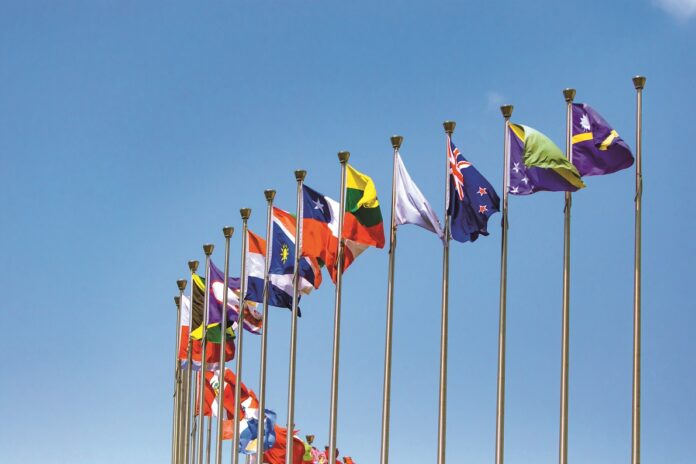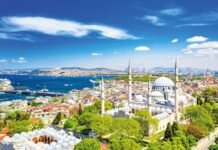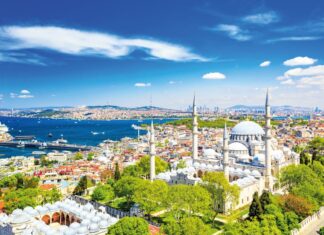Kala Vairavamoorthy explains how greater efforts to extend geographic diversity will allow IWA to expand its influence and contribute more fully to progress on water issues.
Water is by nature inequitable: there’s never enough in any place at the right time. So, India, with 18% of the Earth’s population, gets just 4% of its freshwater. And urban space, with 60% of all people, can capture less than 1% of rain.
To overcome geographic inequity, humans bring three solutions. Engineers capture and convey water to where it is used. Markets trade water-intensive goods from wet region supply to dry region demand. And knowledge exchanges ensure the most useful water experience flows to and from our most effective water professionals to address our thorniest water problems.
Each year, IWA has striven to internationalise that third approach. But further progress won’t happen by default. It is a choice. As the world swiftly changes, our institutional approach must adapt with it: digitalising our knowledge platforms, creating a level playing field that allows equitable participation for all our members, and diversifying our governance structures to be thoroughly and geographically inclusive.
The stakes of adaptation are increasingly high. Rising interest and investments in water – if channeled judiciously – can build widespread urban resilience. A more inclusive IWA can shape important decisions as an innovative hub of pragmatic experience. But we grow influential only to the extent that we fully embrace and empower a global membership to substantially enrich, and equitably access, our water knowledge.
Embracing change
IWA can adapt. The last two years showed how quickly we can respond to fast-shifting circumstances. We reinterpreted our ambitious Strategic Plan through bold forums, ground-breaking exchanges, and versatile initiatives.
The next few years, though, will take IWA beyond reactive testing, to lock in proactive transformation. This transformation will ensure full engagement of the global south – in a geographically inclusive expansion, that is driven by opportunity. Disadvantaged countries need not ‘copy’ water systems of industrialised countries or ‘follow’ their example. Rather, they can adapt, improve upon, and eventually surpass them.
Sounds audacious? Perhaps. But by more universally sharing our experience and knowledge, IWA empowers cities in developing nations to secure their own water and sanitation systems, on their own terms and timetables. These customised solutions can prove more efficient and less costly than many 19th and 20th century legacy systems. They can, for example, ensure cleaner, low-carbon and energy-neutral productive usage that doesn’t ‘treat and dispose’ of urban effluent, but captures and extracts value from wastewater in a circular economy.
Legacy systems that have evolved, appropriate to their time and place, provide lessons that won’t be erased. But they will face hungry competition, as IWA unlocks a more globally inclusive marketplace of ideas, enriched by more diverse perspectives, anchored by inter-cultural partnerships and universal access to knowledge for anyone, anywhere, anytime, in any format.
Knowledge without borders
Why emphasise geographic inclusion? The pandemic offers one painful answer. As the lethal virus ignored borders, the impacts worsened for any nation, city, culture, class, gender or age group that turned inward, that refused to ask questions or share knowledge, that clung to false notions of exceptionalism. The converse also proved true. Only by mass collaboration – an approach that valued unique views, realigned competing interests, welcomed fresh ideas, forged strong linkages, and drew on diverse sources of information – could we turn the tide.
A diverse and inclusive network is even more vital to our sector. Physical water may be simple. Our basic need for it is universal. But as cities expand over time, the integrated management of water and sanitation has grown so complex, that the fates of entire civilisations depend on the collective knowledge of those who decide how much flows, where and when, and at what quality or cost. From ancient Egypt’s Nilometers and Rome’s aqueducts through modern megacity networks of pumps, pipes and plants, a mastery of water’s dynamics and value has never been more valuable.
In the past, many experts derived status from clubby exclusivity. Fortunately, more saw greater benefits – to themselves and to humankind – in widening the circle, reaching outward, asking questions of each other. These wise water leaders documented hard-earned lessons (successes and failures), sharing experience not only with a few select disciples, but with external critics, complete strangers, and future generations. They honoured an endless diversity of perspectives.
IWA embodies the confident spirit and dynamic momentum of this ever-expanding network. It democratically shuns institutional filters of age, gender, geography, or even sector, giving all members a voice. At the same time, by holding our members to the highest standards – peer reviewed science, replicable experiments, and proven outcomes in multiple contexts – we ensure robust outcomes and irreversible progress for public health and well-being.
Yet all institutional progress stems from its roots. Its origins. A global network of water specialists is only as effective as the diverse sources and unique systems that its members care for, utilise, create, manage, and share. And that highlights a geographic dichotomy: water’s most urgent problems and its most practical solutions vary dramatically, by people and place. Location fundamentally determines inputs, options, and outcomes. Context is paramount.
Thus, water professionals from the global north bring a perspective and arsenal in response to, say, climate change or human waste, which may differ wildly from the needs and strengths of counterparts in the global south. This dichotomy isn’t good or bad. It just is. So, how can we resolve it?
Catalyst for innovation
For decades, IWA has valued both perspectives equally and at once. This traditional approach, a dual path of differentiated priorities, is manifest in two ongoing flagship events: our World Water Congress & Exhibition and our Water & Development Congress & Exhibition. Each has a distinct focus and constituency; each takes place, in alternating years, in an exemplary city. Whether in Copenhagen or Colombo, these dual congregations generate immense value and will continue to thrive as they unite global water professionals along parallel lines.
Only now, the global ‘crisis’ of COVID-19 also revealed the global ‘opportunity’ for IWA’s parallel lines to cross. To intersect. To let constituencies merge through a digital transformation, an unprecedented growth opportunity for knowledge sharing.
Digital transformation
Nothing illustrated this massive growth opportunity better than last year’s Digital World Water Congress. When locked down, we did not scale back, downsize, or turn inward. Forced to adapt, we embraced a virtual format, hosting 2300 delegates from 95 countries, including countless women and men, young and old, who otherwise could never have participated.
Yet, that was merely the highest-profile event among many free and ordered ‘places’ where IWA has embarked on a digital transformation.
One quiet catalyst involves the written word. IWA’s highly regarded publications are now utterly, irreversibly digital. Journals long locked behind an exclusive paywall are all now fully open access, with renewed scope and relevance for practitioners in the global south. On the demand side, that means anyone with internet access can obtain our water knowledge for free. On the supply side, there’s no fee for contributors who wish to submit articles for review. To mitigate potential geographic bias, IWA’s Secretariat will establish a facility that will encourage more submissions from the global south and help would-be authors to prepare papers to increase their likelihood of earning publication. The result is a measure (by downloads and submissions) of the diversity, richness, and flow of water knowledge.
Elsewhere, Zoom-boosted attendance has swelled the ranks and diversity of Specialist Group meetings. Recorded lectures and webinars can be paused, rewound, and resumed. Courses on IWA Learn expand opportunities for professional education and certification. Online workshops allow remote, quiet voices to be heard loud and clear. IWA’s new content management system means archived material is a click away from any researcher, anywhere.
Real contact has meaning of course. Gatherings in person remain an invigorating part of IWA’s activities, keeping us vibrant and engaged. Face-to-face, live meetings will always endure.
Equitable engagement
Research published in the publication Nature found that physical conferences may unwittingly and passively reinforce those clubby old barriers of insular exclusivity. By removing paywalls on content, by waiving fees for virtual registration, IWA will lower or erase barriers of bureaucracy or affordability. Combined, these measures lift the burdens of distance, time, money, and carbon emissions.
Long after lockdowns end, IWA will continue to embrace the opportunities of digital infrastructure. This is not to boost online traffic, hits, or citations, but rather to level the playing field. To democratise water knowledge. To ensure a meritocracy in which IWA members can develop followers and become influencers – judged by their focus, energy, ideas, and ability to cultivate important conversations, rather than their ability to fly long distances to events.
The heart of our digital infrastructure is our revamped online membership portal. IWA Connect will soon graduate into a more intuitive platform, linking water professionals to each other and to IWA’s enhanced and personalised services. A more robust feedback system will enable more members to share experiences, provoke ideas, rank priorities, and forge new bonds with inspirational strangers. Unlike the noise of social media megaphones, IWA’s network amplifies the clear voice of any water professional offering useful experience in just the right place.
Geographic inclusiveness benefits all. By removing physical and financial barriers, IWA’s wealth of water knowledge is as likely to flow South-South and even South-North as it is North-South. This is all the more so given the growing strength of research organisations in the global south.
Consider the ways water professionals approach sanitation, a warming climate, or both at once. Evolving in damp industrialised cities, half of the world may enjoy flushing away human waste to centralised wastewater plants for treatment before diversion back to nature. And yet for all their wonder, Berlin or Toronto’s resource-intensive centralised sewage infrastructure simply may not make as much sense for, say, Accra, or Dhaka, or Lima.
Smart solutions
There, necessity drives innovation. As they strive to lower emissions, adapt to water stress, and meet the WASH demands of fast-urbanising populations, water professionals seek alternatives to ripping up streets to lay down pipes. They seek outcomes defined by local context and capacity. One climate-smart and budget-friendly solution is non-sewered sanitation (NSS) – where IWA created a dedicated Specialist Group and, more recently, a work programme to support pragmatic regulatory frameworks that advance inclusive, city-wide sanitation.
Exhibit A: Kampala Capital City Authority (KCCA). Rather than export revenues to import OECD skills and technology, KCCA developed a mobile-empowered GIS-based platform of its own. The NSS system ensures more regular, efficient, and effective management of septic tanks by linking pit-emptiers and customers via a call centre. This home-grown app generated 5000 jobs (with a 63% increase in income), ensuring local money stayed in local circulation.
That’s just one local urban context. But imagine the diversity of options that await water-scarce India, which plans to invest $36 billion over five years to meet the water supply and sanitation needs of 26 million families. The legacy infrastructure of 20th century pipes, pumps and toilets may be fitting and appropriate. But if not, India can now source new and exciting alternatives from water professionals sharing their work from nearly every point on the compass.
The benefit of more inclusive sharing of water knowledge and innovation doesn’t stop there, or anywhere. It doesn’t stop. That’s the point of a circular economy.
IWA can transform water knowledge only if it first becomes the change we want to see in the world. To fulfil our destiny, to realise the geographic depth and breadth of the ‘International’ in our name, IWA’s membership, leadership, and governance structure must better reflect the underrepresented water users of the world. We must, ourselves, diversify.
Such work has already begun. This is manifest in 1000 new individuals joining in South Asia. Or the additions to our rank of Governing Members such as Bangladesh, Bolivia, Ecuador, and Vietnam. Or our growing partnership with the African Water Association (AfWA). But we can go further. By advancing greater equality of opportunities (not of outcomes) we ensure IWA’s new platforms, initiatives, content, channels, products, workshops, and events will generate richer, more diverse, egalitarian, and thus more legitimate outcomes.
Again, this is not altruism. It is seizing the opportunity to enhance our global credibility. IWA’s 2019-2024 Strategic Plan articulates our desire to expand our presence and support the water sector across Asia, Africa, and Latin America and the Caribbean. There, in the world’s fastest-urbanising regions, IWA can escalate momentum through our 2025-2030 Strategic Plan. That positions us at the heart of decision-making for the Sustainable Development Goals deadline.
Looking ahead to 2030, local water systems face ominous compounding threats. These include a volatile cocktail of climate change, widening inequality, population explosions, recessions, urbanisation, and pandemics. Yet I remain excited. Why? Because IWA is prepared to respond in ways that ensure resilience.
As an influential network, we will expand universal access to local water knowledge, empowering hundreds if not thousands of cities to do more with less. Much as cellular technology made fixed phone lines obsolete, and digitisation removed physical limits of sharing ideas, water professionals in the global south – for that matter, those in the global north – can now ‘leapfrog’ many 19th and even 20th century approaches. Our more globally diverse menu can offer new or hybrid models that circulate water more efficiently, treat it at lower costs, have a smaller plant footprint, burn half the energy, and emit a fraction of the carbon emissions. In sum, IWA will over the next two decades not only usher in a ‘golden age’ of water, wastewater and sanitation in the global south. We will lead it.
The measures we take now – driven by digitalisation, its capacity to democratise, and our desire for diversity – will transform our organisation by harnessing the power of network effects.
Knowledge is no zero-sum game, where some only gain at others’ expense. On the contrary, much as diverse tributaries combine into a powerful river, so our once-isolated streams of experience will flow faster, richer and stronger when combined. And IWA’s geographically inclusive hub will expand its influence to become a truly global confluence of people and ideas.
Dr Kala Vairavamoorthy is CEO of the International Water Association








